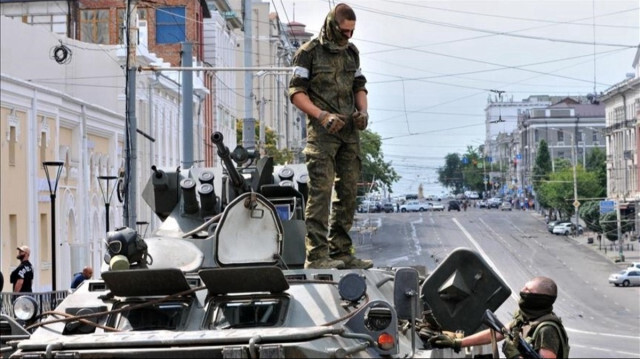

File Photo
'These are extremely dangerous mercenaries, ruthless and cruel,' says Poland's prime minister, expressing concern about Wagner Group's presence in Belarus
The Russian paramilitary Wagner Group poses a potential threat to Poland, Prime Minister Mateusz Morawiecki said on Thursday, calling its soldiers "extremely dangerous mercenaries."
"These are extremely dangerous mercenaries, ruthless and cruel," Morawiecki said at a press conference in Sutno, southeastern Poland.
"We would have the Wagner Group in Warsaw in two hours if it weren't for our military protecting our borders and our government taking appropriate measures," he said.
Soldiers from the Wagner Group have been moving to the border between Belarus and Poland this month, the Russian TASS news agency reported, citing sources in the Belarusian Ministry of Defence.
The Polish Defence Ministry, citing Western intelligence, claimed that there are about 3,500 Wagner troops in Belarus, with plans to transfer up to 10,000. Wagner Group chief Yevgeny Prigozhin is reportedly taking part in joint training with special forces of Belarus near the village of Osipowicze in the Mogilev region.
On July 23, Belarusian President Alexander Lukashenko said the Wagner Group is putting pressure on his country with the intention of pushing across the border into neighboring Poland.
“Maybe I shouldn't say it, but I will. The Wagnerites began to strain us: ‘We want to go to the West. Allow us.’ I said, why do you need to go to the West? ‘Well, to go on an excursion to Warsaw, to Rzeszow'," Lukashenko said during a meeting with his Russian counterpart Vladimir Putin in St. Petersburg.
Lukashenko said he is keeping Wagner Group forces in the country’s center, as per the agreement reached during the paramilitary group's short-lived mutiny in late June.
Belarus does not want to relocate them near the Polish border because "their mood is bad," he added.
Putin has also recently said NATO member Poland intends to retake territory in western Ukraine and has similar plans for Belarus. He noted that a Polish brigade is now 40 kilometers (25 miles) from Brest and that Warsaw has a Leopard tank repair facility in Rzeszow, near the Ukrainian border.
Moscow has moved short-range nuclear weapons into Belarus, a move that NATO Secretary-General Jens Stoltenberg has described as "dangerous and reckless." However, Lukashenko said having Russian nuclear weapons in his country will deter Polish aggression.
Noting the need for defense against potential hostility from across the border with Belarus, Morawiecki said the border fence built since 2021 to deter migrants crossing the border is "a real strengthening (...) We will continue to implement this plan with all our might,” he said.
He added that Poland is still facing the problem of migrants trying to cross the border, with over 16,000 officially counted since the beginning of the year. Since the end of 2021, the Belarusian regime has been helping migrants, mainly from Africa and the Middle East, in crossing its border with Poland.
“This is no joke, and these are not a few attempts to cross the border illegally… this is a planned action of our enemies – Russia and Belarus – who want to destroy our peace and order,” he said.
#Wagner
#Poland
#Mateusz Morawiecki
